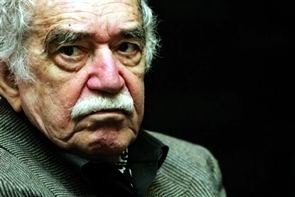(单词翻译:单击)
名著阅读
Without changing his expression, Colonel Aureli-ano Buendía signed the first copy. He had not finished signing the last one when a rebel colonel appeared in the doorway leading a mule carrying two chests. In spite of his entire youth he had a dry look and a patient expression. He was the treasurer of the revolution in the Macon-do region. He had made a difficult journey of six days, pulling along the mule, who was dying of hunger, in order to arrive at the armistice on time. With an exasperating parsimony he took down the chests, opened them, and placed on the table, one by one, seventy-two gold bricks, Everyone had forgotten about the existence of that fortune. In the disorder of the past year, when the central command fell apart and the revolution degenerated into a bloody rivalry of leaders, it was impossible to determine any responsibility. The gold of the revolution, melted into blocks that were then covered with baked clay, was beyond all control. Colonel Aureli-ano Buendía had the seventy-two gold bricks included in the inventory of surrender and closed the ceremony without allowing any speeches. The filthy adolescent stood opposite him, looking into his eyes with his own calm, syrup-colored eyes.
"Something else?" Colonel Aureli-ano Buendía asked him.
The young colonel tightened his mouth.
"The receipt," he said.
Colonel Aureli-ano Buendía wrote it out in his own hand. Then he had a glass of lemonade and a piece of biscuit that the novices were passing around and retired to a field tent which had been prepared for him in case he wished to rest. There he took off his shirt, sat on the edge of the cot, and at three-fifteen in the afternoon took his pistol and shot himself in the iodine circle that his personal physician had painted on his chest. At that moment in Macon-do úrsula took the cover off the pot of milk on the stove, wondering why it was taking so long to boil, and found it full of worms.
"They've killed Aureli-ano," she exclaimed.
She looked toward the courtyard, obeying a habit of her solitude, and then she saw José Arcadio Buendía, soaking wet and sad in the rain and much older than when he had died. "They shot him in the back," úrsula said more precisely, "and no one was charitable enough to close his eyes."
At dusk through her tears she saw the swift and luminous disks that crossed the sky like an exhalation and she thought that it was a signal of death. She was still under the chestnut tree, sobbing at her husband's knees, when they brought in Colonel Aureli-ano Buendía, wrapped in a blanket that was stiff with dry blood and with his eyes open in rage.
奥雷连诺上校面不改色,在第一份副本上签了字。他还没签完最后一份副本,帐篷门口就出现了一个起义军官,牵着一匹载着两只箱子的骡子。这人虽然十分年轻,却显得沉着和严谨。他是马孔多地区起义部队的财务官。为了及时赶到,他拖着一匹饿得要死的骡子,经历了六天困难的行程。他从骡背上异常小心地取下箱子,把它们打开,接二连三地将七十二块金砖放在桌上。这是大家忘记了的一大笔财产。在最近一年中,中央指挥部上崩瓦解,革命变成了争当头目的血腥的内讧。在一片混乱中,谁也不负什么责任了。起义者的金子铸成了金砖,抹上泥土,就无人监管了。奥雷连诺上校把七十二块金砖也列入了投降书,不容任何商量就签了字。疲惫不堪的青年军官站在他面前,拿糖浆色的宁静的眼睛盯着他的眼睛。
“还有什么事吗?”奥雷连诺上校问他。
青年军官咬紧牙齿。
“收条,”他说。
奥雷连诺上校亲笔写了一张收条给他。然后,上校喝了一杯柠檬水,吃了一块饼干(二者都是修女给他的),就到准备给他休息的行军帐篷去。他在那儿脱掉了衬衫,坐在床边,下午三点十五分拿起手枪,对准他的私人医生在他胸上用碘酒画的圈子砰地开了一枪。就在这个时刻,在马孔多,乌苏娜揭开炉灶上牛奶锅的盖子,惊异地发现牛奶半天都没煮沸,而且牛奶里有许多虫子。
“他们把奥雷连诺给打死啦!”她叫了一声。
然后,她服从孤独中养成的习惯,朝院子里瞥了一眼,便看见了霍·阿·布恩蒂亚;他在雨下淋得透湿,显得愁眉不展,比死的时候老多了。“他是被暗杀的,”她更准确地说。“谁也没有发发慈悲合上他的眼睛。”
夜里,她透过眼泪看见一个橙黄色的圆盘,仿佛流星一样迅捷地掠过天空,她认为这是死亡的征兆。她仍在粟树下面,伏在丈夫的膝上哭泣。这时他们就把毛毯裹着的奥雷连诺上校抬来了,毛毯已给凝血弄得僵硬。他睁开的眼里燃着怒火。
背景阅读

作者简介:
加西亚·马尔克斯(1927一)哥伦比亚作家,记者。生于马格达莱纳省阿拉卡塔卡镇。父亲是个电报报务员兼顺势疗法医生。他自小在外祖父家中长大。外祖父当过上校军官,性格善良、倔强,思想比较激进;外祖母博古通今,善讲神话传说及鬼怪故事,这对作家日后的文学创作有着重要的影响。
加西亚·马尔克斯作品的主要特色是幻想与现实的巧妙结合,以此来反映社会现实生活,审视人生和世界。重要作品有长篇小说《百年孤独》(1967)《家长的没落》(1975)、《霍乱时期的爱情》(1985)等。
本书简介:
《百年孤独》内容复杂,人物众多,情节离奇,手法新颖。马尔克斯在书中溶汇了南美洲特有的五彩缤纷的文化。他通过描写小镇马孔多的产生、兴盛到衰落、消亡,表现了拉丁美洲令人惊异的疯狂历史。小说以“汇集了不可思议的奇迹和最纯粹的现实生活”荣获1982年诺贝尔文学奖。
创作历程:
从1830年至十九世纪末的70年间,哥伦比亚爆发过几十次内战,使数十万人丧生。本书以很大的篇幅描述了这方面的史实,并且通过书中主人公带有传奇色彩的生涯集中表现出来。政客们的虚伪,统治者们的残忍,民众的盲从和愚昧等等都写得淋漓尽致。作家以生动的笔触,刻画了性格鲜明的众多人物,描绘了这个家族的孤独精神。在这个家族中,夫妻之间、父子之间、母女之间、兄弟姐妹之间,没有感情沟通,缺乏信任和了解。尽管很多人为打破孤独进行过种种艰苦的探索,但由于无法找到一种有效的办法把分散的力量统一起来,最后均以失败告终。这种孤独不仅弥漫在布恩迪亚家族和马孔多镇,而且渗入了狭隘思想,成为阻碍民族向上、国家进步的一大包袱。
作家写出这一点,是希望拉丁美洲民众团结起来,共同努力摆脱孤独。所以,《百年孤独》中浸淫着的孤独感,其主要内涵应该是对整个苦难的拉丁美洲被排斥现代文明世界的进程之外的愤懑[mèn]和抗议,是作家在对拉丁美洲近百年的历史、以及这块大陆上人民独特的生命力、生存状态、想象力进行独特的研究之后形成的倔强的自信。这个古老的家族也曾经在新文明的冲击下,努力的走出去寻找新的世界,尽管有过畏惧和退缩,可是他们还是抛弃了传统的外衣,希望溶入这个世界。可是外来文明以一种侵略的态度来吞噬这个家族,于是他们就在这样一个开放的文明世界中持续着“百年孤独”。作者表达着一种精神状态的孤独来批判外来者对拉美大陆的一种精神层面的侵略,以及西方文明对拉美的歧视与排斥。“羊皮纸手稿所记载的一切将永远不会重现,遭受百年孤独的家族,注定不会在大地上第二次出现了。” 作者用一个毁灭的结尾来表达了自己深深的愤懑。


